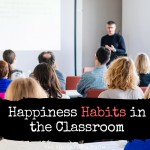Summer for teachers has arrived! While you may be imagining my days are spent lounging by the pool sipping cocktails (don’t get me wrong, I will make that happen eventually), the implication of summer break for me at this point means professional development. Summer professional development takes a variety of forms, from workshops to podcasts to books. Reading, listening, and learning are sources of joy for me; so, while it may not be a day at the beach, I am grateful for the gift of time in the summer, allowing me to grow as an educator.
I’m a fan of many podcasts, and will often tune in while completing mundane tasks like driving, cooking, or cleaning. In the early onset of my love for podcasts, I discovered the importance of my podcast subscriptions being completely isolated from teaching and education. This helped me maintain balance, diversity, novelty, and mental well-being in my day-to-day. One of my first podcast subscriptions was Happier with Gretchen Rubin. It found me at a time when I was seeking personal growth, strategies, and affirmation.
Gretchen Rubin’s Four Tendencies addresses how people respond to expectations, inner and outer. Discussion of her work on her podcast allowed me to examine my own goals and to determine why some goals I was able to accomplish while others seemed near impossible. It also allowed me to be mindful of my interactions with others and the ways they are motivated. If you’re interested, you can discover your tendency here: https://quiz.gretchenrubin.com/.
As luck would have it, Gretchen Rubin crossed paths with Angela Watson, host of education podcast, Truth for Teachers. Watson interviewed Rubin on Episode 123 of her podcast, “Gretchen Rubin on how teachers can use the 4 tendencies to help students (and themselves) to meet goals & expectations.” Straying from my education podcast avoidance, I had to tune it. Examining motivation is an extremely sensible practice for educators. How do we convince students challenges we create for and present to them are worth their while, for their benefit?
We’ve all heard, and made, comments in relation to student motivation in response to expectations. We imagine what school would be like for students “if only they were motivated” or “if they didn’t lack motivation.” We are wrong. We have been wronged, and we are wronging students. If motivation is the desire that causes action, then lack of motivation does not exist. Motivation is ever-present. While a student may not have been motivated to complete your exit ticket, he was motivated to talk with his friends instead.
[bctt tweet=”If motivation is the desire that causes action, then lack of motivation does not exist. Motivation is ever-present.” username=””]
Another common motivation myth impacting education is the negation of intrinsic motivation by extrinsic reward. A frequent discussion among educators is the importance of providing students with opportunities to meet expectations or “do the right thing” simply because “it is the right thing to do.” The argument is incentives, extrinsic motivators, or “bribes” interfere with the development of intrinsic motivation because it relies on some sort of external reward. Extrinsic motivators include but are not limited to points, grades, stickers, treats, rewards, and even verbal praise.
Research does not substantiate the idea that extrinsic rewards negate the development of intrinsic motivation; nonetheless, this claim is widely accepted as truth. Furthermore, determination to foster learning and performance from a solely intrinsic lens is irrelevant to our students and our world. The view of intrinsic and extrinsic motivation as isolated forces is inaccurate. In fact, extrinsic rewards can yield intrinsic motivation. I am not motivated intrinsically to pay my electric bill on time. I am motivated by external factors: late fees and having my electricity cut off, for example. This is not childish of me; it is human of me. Watson stated in her episode of Thoughts for Teachers with Gretchen Rubin, “it’s just nearly impossible to develop intrinsic motivation for certain tasks, especially if we’re talking about low-level and mundane work.”
Motivation myths can stand in the way of our acknowledgment of student strengths and desires when we view certain responses to expectations as positive or negative. When we bust the myths and accept motivation for what it is, a sticker or celebration doesn’t have to indicate a lowering of expectations or a devaluing of accomplishments, but rather a readiness to address the unique gifts and needs of our students.






